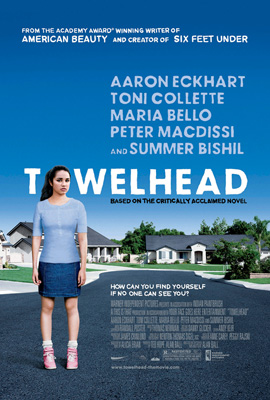“Towelhead” goes deep
Controversial, complicated, and heartfelt. These words describe screenwriting maven Alan Ball’s directorial debut, “Towelhead.” Based on the Alicia Erian novel of the same name, the film is about a 13-year-old Arab American girl Jasira (Summer Bishil) who moves away from her selfish, immature mother (Maria Bello) to a Texas suburb with her father (Peter Macdissi) during the Gulf War.

‘Towelhead’, directed by Alan Ball, is a drama about a 13-year-old girl struggling in a new and suburban life.
September 17, 2008
Controversial, complicated, and heartfelt. These words describe screenwriting maven Alan Ball’s directorial debut, “Towelhead.” Based on the Alicia Erian novel of the same name, the film is about a 13-year-old Arab American girl Jasira (Summer Bishil) who moves away from her selfish, immature mother (Maria Bello) to a Texas suburb with her father (Peter Macdissi) during the Gulf War.
Jasira is at the intersection of childhood and adulthood. She has matured early physically and her bigoted, Army reservist neighbor, Travis (Aaron Eckhart), takes a significant sexual interest in her.
Her naiveté and his pedophilic obsession collide in a series of sexual encounters that lead to a crash course in sexual education for Jasira. Domestic problems with her racist father, who is mercilessly harsh and unforgiving in his criticism, don’t get any better when Jasira dates a black classmate who has an agenda of his own.
One couple is a refuge for all her problems.
The pregnant Melina Hines (Toni Collette) and her husband, Gil (Matt Letscher) try to look out for their young neighbor. Their example of love with a healthy amount of disapproval provide a good character example of parental figures among an array of flawed characters.
While this is a heavy plot dealing with controversial issues, Ball never falls into the stereotypical camps of desensitizing or over sensationalizing the sexual content, but finds a good, even-tempered balance. This is important because this type of film could draw intense scrutiny from all sides.
Ball moralistically shows just enough to make the film authentic, and to partially be a cautionary tale as well. While he obviously shows the horrible choices of certain characters, he never draws them as simple, but rather as nuanced human beings with faults and strengths laid bare.
Even Travis, who becomes sexually involved with Jasira, has likable qualities. Yet almost all of the characters are seen for who they are with dual natures at play.
In one respect, they are good people, like Jasira’s father, but carry around thoughts and deeds that are full of prejudice, anger, and selfishness.
The undercurrent of tension that pervades this film is quite effective. Minimal amounts of music, close-up angles, and frame crowding visually draw in the viewer and serve as a source of constant apprehension.
Each of the actors perform exactly as they should, never giving any more than the character needs. As an ensemble, they all carry the great writing to another level, which brings the story even more alive.
Ball, as usual, completely defies convention and grows even more as an artist. He builds upon similar themes of identity, sexuality, love, family relationships, and search for meaning in this crazy world, without repeating from his work in “American Beauty” and “Six Feet Under.” This is a solid original work proving, once again, that Ball is one of the best artists coming out of the industry today.
This film is suggested for those who want to see cinema at its most difficult and best points. It is not for all to see because of its frank sexual nature, but for some it should not be missed.






